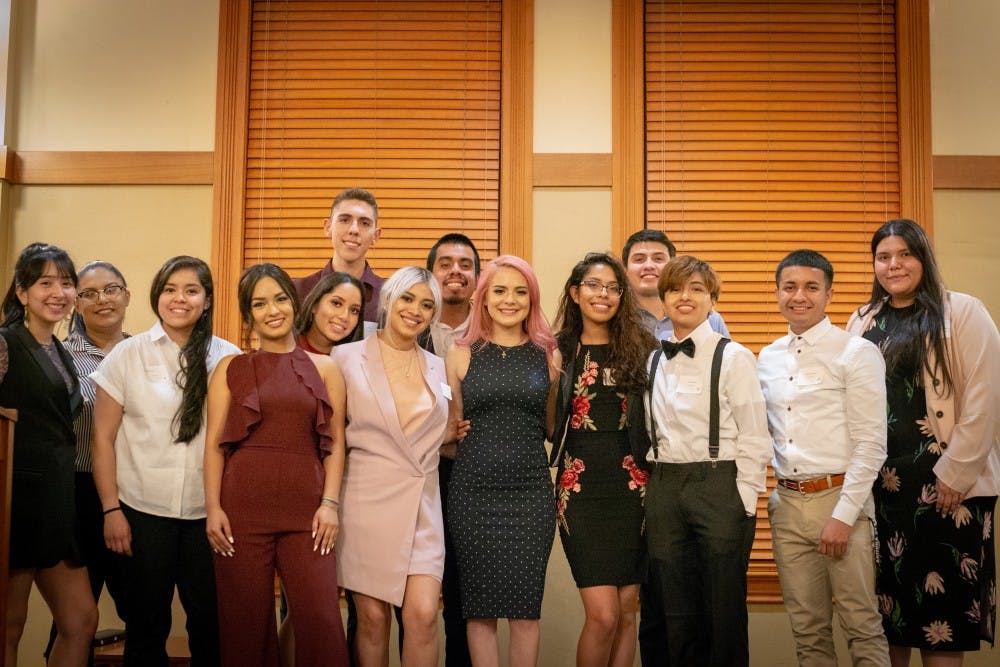A group of ASU organizations have come together to provide a scholarship for students who are undocumented or recipients of the Deferred Action for Childhood Arrivals program.
Undocumented Students for Educational Equity, El Concilio, and Associated Students of ASU collaborated on the WE RISE Scholarship, which was created to honor the University's charter and its emphasis on diversity. The award will help make higher education more accessible to undocumented, according to a post on the Facebook page of DREAMzone ASU, a University program that works to increase institutional support for DACA recipients.
Denis Alvarez, a sophomore majoring in secondary education and the advocacy director for USEE, said it was important that the scholarship is more inclusive than others.
Alvarez said that the scholarship is open to both DACA recipients and other undocumented students, whether they're already attending ASU, plan to transfer to the University from another college or are online or graduate students.
The organizations fundraised money for the scholarship through a benefit dinner on April 1. This year was the group's second annual scholarship dinner, but the first dinner focused on the Dream Fund, which spefically serves DACA recipients.
Undocumented students and DACA recipients are ineligible for receiving federal student aid, and were barred from receiving in-state tuition following an Arizona Supreme Court ruling in April 2018.
Read more: Arizona Supreme Court rules DACA recipients cannot receive in-state tuition
Aly Perkins, a senior majoring in public service and public policy and the president of USG Downtown, said that USG and USEE worked together to create the WE RISE Scholarship.
Perkins said that a scholarship like this is important because if one portion of the community is hindered, it hinders the entire community.
“We need undocumented students to contribute their skills and talents to our communities so that we can thrive together," she said. "So that means that we have to come together and help each other out when we need it most."
Since the Trump administration announced in 2017 that the government would stop accepting DACA applications, the number of students who will still have DACA protections upon graduating high school has fallen, Alvarez said.
Courts blocked the administration's decision, pushing it to continue accepting DACA renewal applications even after trying to eliminate the program. But the two-year protection that DACA offers is only available to individuals who already had it in 2017, meaning that students who hadn't yet aged into eligibility by that time could graduate from high school without that support.
“We want to make sure these students have the funds to go to school as well," Alvarez said. "So for us it’s been like, 'ok, we've made it to ASU, we're here. What can we do in order for other students to make it here as well?'"
Alvarez said the scholarship amount and the number of students who get the awards depends on how much money is raised, and she wants the students who do not receive the scholarship to know that USEE is still a resource for them.
The amount of money awarded for the scholarship and the number of people who can receive it is still being determined as the groups tally the funds raised from the dinner.
She said that if a student doesn't get the scholarship, there are other scholarships offered to undocumented students and DACA recipients. These scholarships are incredibly important for a students' advancement, she said.
“I truly believe that education leads you to more opportunities in life, whether it's a personal growth or a professional growth I think that the education helps us thrive,” Alvarez said.
Elizabeth Rosenkrantz, assistant director of ASASU, said besides the dinner fundraiser, the scholarship will be open for people to donate "always and forever."
"It will always be there," Rosenkrantz said. "So even six months from now, if someone found that link or wanted to donate from the (ASU Foundation) site, they will always be able to."
She added that the scholarship’s inclusivity ties back to the values in ASU's charter.
"It’s whom we include, not whom we exclude," she said. "I think by doing these type of events, and from community members being there to various ASU faculty and staff being there and students being there, I think it shows how strong our community is."
Rosenkrantz also said she hopes that students will see this as an opportunity to pursue higher education.
“I think that's hard when those of us who might not directly identify as DACAmented or undocumented students, that we never could fully understand the roadblocks that they have to go through," she said. "And so I hope by doing these things that they see that the ASU community wants them to succeed."
Reach the reporter at bstoshne@asu.edu and follow @itsbrennaaaa on Twitter.
Like The State Press on Facebook and follow @statepress on Twitter.




